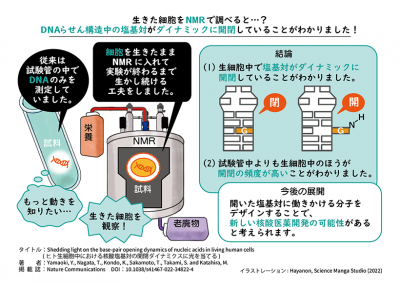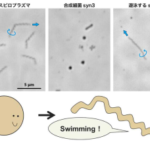化合物がマウスの腫瘍を死滅させ、ヒトのがん細胞も多重に死滅させることに成功 Compound kills tumors in mice, human cancer cells in multiple
2022-11-22 ワシントン大学セントルイス
(R)-9bと呼ばれるこの薬は、癌を動かす遺伝子である癌遺伝子をブロックする低分子化合物である。
この薬は、ACK1という遺伝子をブロックするのだ。研究者たちは、この遺伝子が欠落したときに何が起こるかを調べるために、この遺伝子を完全に欠落させたマウス系統を開発した。
腫瘍が発生した少数のマウスでは、腫瘍は野生型マウスの腫瘍に比べて小さかった。これは、この遺伝子を欠損したマウスで何か重要なことが起こっていることを示す最初の手がかりとなった。研究者たちは、彼らが、癌細胞に対して強固な免疫反応を起こすことができることを発見した。
この遺伝子を持つマウスという別のマウスに、ヒトの前立腺腫瘍を移植して、この遺伝子をブロックする薬剤を与えたところ、同じ効果があった。この薬剤はまた、T細胞が腫瘍に侵入し、がん細胞をより効果的に殺すことを可能にするシグナル伝達分子も増加させた。この(R)-9bで治療したマウスにできた腫瘍は、対照群のマウスの腫瘍よりもはるかに小さかった。
<関連情報>
- https://source.wustl.edu/2022/11/drug-triggers-immune-cells-to-attack-prostate-cancer/
- https://www.nature.com/articles/s41467-022-34724-5
ACK1を介したC末端Srcキナーゼのリン酸化の抑制は、前立腺がん免疫チェックポイント阻害剤耐性に対抗する Inhibiting ACK1-mediated phosphorylation of C-terminal Src kinase counteracts prostate cancer immune checkpoint blockade resistance
Dhivya Sridaran,Surbhi Chouhan,Kiran Mahajan,Arun Renganathan,Cody Weimholt,Shambhavi Bhagwat,Melissa Reimers,Eric H. Kim,Manish K. Thakur,Muhammad A. Saeed,Russell K. Pachynski,Markus A. Seeliger,W. Todd Miller,Felix Y. Feng & Nupam P. Mahajan
Nature Communications Published:14 November 2022
DOI:https://doi.org/10.1038/s41467-022-34724-5

Abstract
Solid tumours are highly refractory to immune checkpoint blockade (ICB) therapies due to the functional impairment of effector T cells and their inefficient trafficking to tumours. T-cell activation is negatively regulated by C-terminal Src kinase (CSK); however, the exact mechanism remains unknown. Here we show that the conserved oncogenic tyrosine kinase Activated CDC42 kinase 1 (ACK1) is able to phosphorylate CSK at Tyrosine 18 (pY18), which enhances CSK function, constraining T-cell activation. Mice deficient in the Tnk2 gene encoding Ack1, are characterized by diminished CSK Y18-phosphorylation and spontaneous activation of CD8+ and CD4+ T cells, resulting in inhibited growth of transplanted ICB-resistant tumours. Furthermore, ICB treatment of castration-resistant prostate cancer (CRPC) patients results in re-activation of ACK1/pY18-CSK signalling, confirming the involvement of this pathway in ICB insensitivity. An ACK1 small-molecule inhibitor, (R)-9b, recapitulates inhibition of ICB-resistant tumours, which provides evidence for ACK1 enzymatic activity playing a pivotal role in generating ICB resistance. Overall, our study identifies an important mechanism of ICB resistance and holds potential for expanding the scope of ICB therapy to tumours that are currently unresponsive.

